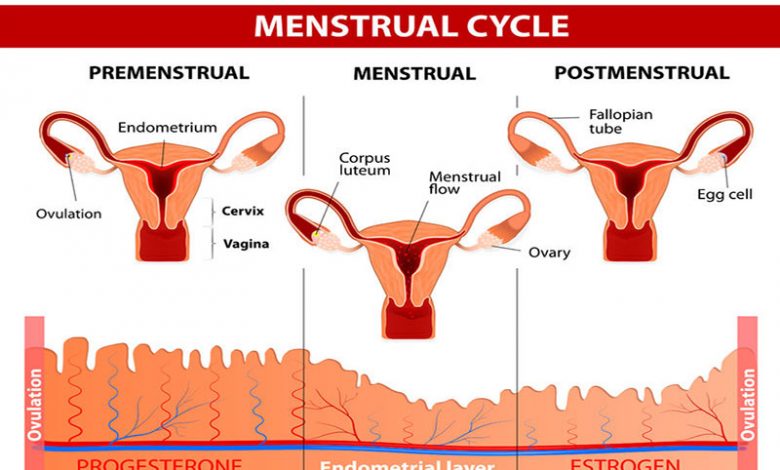What Are the 4 Stages of the Menstrual Cycle?

The menstrual cycle consists of four key stages, namely menstruation, the follicular phase, ovulation and the luteal phase.
Menstrual Phase
The menstrual phase of your cycle starts on the first day of your period. If an egg from a previous cycle is not fertilised, then your body will start to shed its thickened uterine lining (endometrium).
This thickened uterine lining is there to support a baby, so your body eliminates it if it isn’t needed. When this happens, you experience your period, which is made up of a mixture of blood, mucus and tissue. For most women, their menstrual phase lasts for between 3-7 days on average.
During this phase, you might experience cramping, bloating, some pain or discomfort in your lower back, mood swings, headaches, irritability or tender breasts.
Follicular Phase
The follicular phase also starts on the first day of your period, therefore overlapping the menstrual phase, and ends when you begin to ovulate. During the follicular phase, the hypothalamus communicates with your pituitary gland to stimulate your ovaries, releasing the follicle-stimulating hormone (FHS).
Once stimulated, your ovaries produce between 5-20 follicles which bead on the surface, each containing an immature egg. From here, one or two eggs will mature, causing a rise in the hormone, oestrogen.
Once again, this rise in oestrogen will cause your uterine lining to thicken to hold, nurture and grow the embryo. On average, this phase lasts for about 16 days.
Ovulation Phase
Another hormone released during the follicular phase, called luteinizing hormone (LH), sends your body into the ovulation phase, after only a day or two.Å,Ç The egg later travels down the fallopian tubes to be
fertilised. Those who are trying to fall pregnant will want to do so during this phase, as it’s the window where you are the most fertile.
Ovulation generally occurs about midway through your cycle, if you have a 28-day cycle. If the egg isn’t fertilised, the egg will die after 24 hours. You might find that during this time you have a thicker than usual discharge and a slightly higher temperature.
Luteal Phase
Once ovulation ends and you enter into the luteal phase, the egg-containing follicle turns into what’s
known as a corpus luteum, which initiates the body to start producing both oestrogen and progesterone. This elevation in hormones keeps your uterine lining thick to support pregnancy, however, the corpus luteum reabsorbs into your body if no egg is fertilised.
As this reabsorption happens, oestrogen and progesterone levels will decrease once more, once again leading to a shedding of the uterine wall – formerly mentioned as your period.⁴ The average duration of the luteal phase is around 2 weeks, during which you may feel symptoms which come with premenstrual syndrome (PMS).
What Is the Best Way to Track My Menstrual Cycle?
The best way to track your cycle really depends on what’s the most convenient for you. Before apps were invented, many women used desk or wall calendars, or simply kept a diary. Today, you have period tracking apps, digital calculators, calendars and diaries, as well as all the traditional tracking methods.
If you prefer a quick, convenient option, you’re probably best off using a calendar or tracking app. If you have some extra time on your hands or you’re looking to monitor your menstrual cycle a little more closely, keeping a journal would be a great option for you.
Journals are also a great way to note anything out of the ordinary that you may experience during your cycle, offering you key insight into what’s best for you and your body. For example, you might choose to
highlight certain foods that make your pain better or worse, mark high-stress days or simply note your mood at different phases of the cycle.
Why Is It a Good Idea to Track My Cycle?
Although we are all unique and therefore so are our cycles, it’s a good idea to keep track of what’s normal for you. This way if anything seems off, you can get your eyes on it early. It can also help those who are trying to have a baby monitor their ovulation phase, when they’re most fertile. This is known as the fertility window.
Why Is My Menstrual Cycle Getting Shorter?
If you do notice any changes to your cycle, specifically in terms of length, you may want to pay some special attention to your body’s “fight or flight” stress responses.³ A highly stressful lifestyle can cause our periods to become irregular by starting sooner, later or even disappearing altogether.
Your menstrual cycle may also shorten or lengthen before your hormones balance out, like during puberty or as you mature. In some cases, this could also point to an underlying health condition, so it’s always best to check with your medical practitioner.
Follow – https://healthcaresutra.com for More Updates